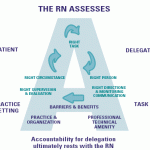By Rose O. Sherman, EdD, RN, FAAN
Treat people as if they were what they ought to be and you will help them become what they are capable of being – Goethe

Many nurses find it difficult to delegate tasks to other members of their health care team. It is not uncommon to hear a nurse say that they could finish the task themselves in the time that it takes to explain it to someone else. While this may be true, it is shortsighted. When done well, delegation can be a very effective management tool. It frees professional nurses to attend to more complex patient needs. At the same time, delegation helps to develop the skills of nursing assistive personnel and it is also more cost-effective for the organization. By the end of the decade, this skill will become critical when there is a shortage of both professional nurses and nurse leaders.
Ineffective delegation or the lack of follow-up for tasks delegated can result in errors or omissions of care. As part of professional standards and licensure, specific guidance is often provided to nurses about the delegation of nursing care. In the United Kingdom, qualified nurses who are registered by Nursing and Midwifery Council (MCN) delegate care to Health Assistants but retain responsibility for care delegated (advice on delegation). In the United States the National Council of State Boards of Nursing (NCSBN) has a position paper that describes delegation as the transfer of authority by a qualified nurse to a competent individual for the purpose of completing selected tasks or activities. This assignment should be based on the assessment of the patient’s needs and the scope of practice and skills of the individual to whom care is delegated. This could be to another Registered Nurse, Licensed Practical Nurse or Patient Assistant. Follow-up guidance and supervision of care is expected. In most US states, activities that include the use of the nursing process (nursing assessment, diagnosis, plan of care, reassessment and evaluation of patient outcomes) can only be delegated to a Registered Nurse.
Prior to delegating in any setting, nurses need to understand the practice act or professional responsibilities that are part of their licensure. In addition to this information, it is also important to review the policies that a health care agency has regarding delegation. The following framework (NCSBN) can be then be used in the delegation process:
Step One – Assessment and Planning Questions to Ask
Goal – Give the Right Task under the Right Circumstance to the Right Person
- What are the needs and condition of the patient?
- What level of clinical decision making and assessment is needed?
- What is the predictability of the patient’s response to care?
- What is the potential for adverse outcomes associated with the delegated performance of tasks and functions?
- What are the cognitive and technical abilities needed to perform the activity/function or task?
- Which team member has the scope of practice, skills, competencies and experience to perform the task needed?
- What is the context of the situation and the environment – was the patient just admitted, is it a high acuity environment?
- What level of interaction/communication is needed in the care of the patient and with whom?
Step Two – Communication Questions to Ask
Goal – Give the Right Direction
- How is the task to be accomplished?
- When and what information should be reported?
- What is the process for seeking clarification about delegated care?
- What are the communication expectations in emergency situations?
Step Three – Supervision Questions to Ask
Goal – Provide the Right Supervision
- What level of supervision and observation needs to be provided?
- What should be the frequency of monitoring and observing care?
- How will the completion of care be verified and documented?
- How will unexpected changes in a patient’s condition be managed?
Step Four – Observation and Feedback Questions to Ask
Goal – Assess the Effectiveness of Delegation
- Was the delegation successful?
- Is there a better way to meet the needs of the patient?
- Is there a need to adjust the plan of care?
- Were there learning moments for staff or the nurse who delegated care?
- Was appropriate feedback and follow-up provided?
- Was positive feedback given when appropriate?
Delegation is both a science and an art. The science to delegation involves understanding professional responsibilities from a legal standpoint. The art involves making sure that good communication takes place during the delegation process. Part of being a good leader is help professional nurses understand the need to develop their team members through delegation rather than demonstrating a lack of confidence in others or a need for control.
Question – What are issues that you have seen with delegation in your work settings?
Read to Lead
Gillen, P. & Graffin, S. (2010) Delegation in the United Kingdom. Journal of Online Issues in Nursing. Click Here for the Article
Hansten, R.I. & Jackson, M. (2008). Clinical Delegation Skills. Jones Bartlett Publishers.
© emergingrnleader.com 2011


 LinkedIn
LinkedIn Instagram
Instagram